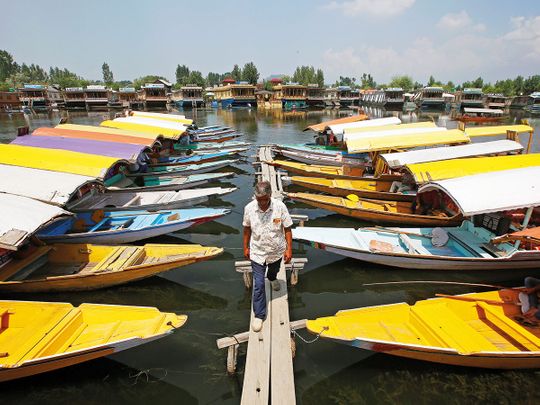
More on Kashmir
- Srinagar woman selected to study master’s at Oxford University, makes Kashmir proud
- COVID-19: Kashmir’s cherry farmers struggle to sell bumper harvest
- Bollywood: Vidhu Vinod's 'Shikara' trailer re-lives searing chapter of Kashmir history
- Kashmir photographers win Pulitzer for coverage
- India grants diplomats access to Kashmir for first time in months
August 5, 2020, marked the first anniversary of the decision by the government of India to reorganise the state of Jammu and Kashmir into two Union Territories, namely Jammu and Kashmir and Ladakh, with a purpose to deliver socio-economic justice and put the state on fast track of development, so that the benefits could reach the grass root level.
The government has ensured that a number of laws, which were in vogue in the erstwhile state of Jammu and Kashmir are modified/amended in a way to adapt modern time challenges. These laws also ensured equal rights to women, and laws to ensure social, economic and political rights of women, children and disadvantaged category. Now the residents of Jammu and Kashmir enjoy Right to Free and Compulsory Education Act, Protection of Women from Domestic Violence, Protection of Human Rights Act, and Mahatma Gandhi National Rural Employment Guarantee Act (MNREGA) and so on. In direction to the integration, phase one of the programme “One Nation, One Ration Card” has already been implemented in the state.
To ensure democracy at grass root level, elections to Block Development Councils were held for the first time in Oct 2019 with a massive voter turnout. Over Rs1500 crore has been transferred to Panchayats to strengthen local development and address needs. Government officials spent two days in ‘Back to Village Programme’ a unique initiative in itself, to understand the requirements at grass root level. Now, a drop box has been put in each Panchayat for complaints and grievances of the citizens, and they are regularly monitored.
In land reforms, the Indian government has taken an important initiative to transfer the process of registration from the judiciary to a separate department and appointed 77 sub-registrars. Like in other parts of India, stamp duty administration is being computerised and e-stamping rules have been framed. In the last one year, 24,676 registrations were carried out.
Government is committed to connect Kashmir with the rest of India and Udhampur-Srinagar-Baramulla rail link project will be completed by year 2022. The world’s tallest bridge on Chenab River at 359 metres height, is one of the finest engineering marvels in the contemporary world and expected to be completed by next year and will pave the way for a direct rail link to Srinagar from the rest of India. Apart from this, the 8.45 kilometre-long Qazigund-Banihal twin tube tunnel is in its completion phase and will be operational by next year.
These steps will pave the way for faster economic development and integration with the rest of the country. Not to mention that tourism is going to get a big boost with this step. Government has already approved mega plans to convert Srinagar and Jammu into Smart Cities and projects for upgrading infrastructure, and provide efficient public transport system in both cities including flyovers, rapid transit system (metro) are in the pipeline. Over 500 languishing projects have been completed in the last one year. Jammu and Kashmir Infrastructure Development Finance Corporation has been set up, which raised a fund of Rs8,000 crore, in which more than 4000 small and medium projects have been sanctioned to create or upgrade infrastructure.
The Indian government is also ensuring electricity in every home and clean energy to every kitchen through its flagship schemes Ujala, Saubhagya and Ujjawala in the region. Hundred per cent coverage of electricity even at tough, mountainous and snowbound areas is being ensured. More than 3.57 lakh households have been electrified before target date and 1.26 million gas cylinders distributed under Ujjawala scheme to support women in Jammu and Kashmir.
Kashmir is known for its world famous apples and saffron. In the last one year, Kashmiri saffron has been given a Geographical Indication (GI) tag and an International Kashmiri Saffron Trading Centre is being established in Pampore to facilitate collection, processing and e-auction of saffron.
The Indian government is also facilitating the selling and marketing of Kashmiri apples in different places through NAFED, in which thousands of farmers are being benefited.
First pre-summit level meet of Global Investors Summit was held in New Delhi last year, inviting investments from across the world. Roadshows were also organised by the state government in metro cities, wherein, 168 Memorandum of Understanding worth Rs13,600 crore were inked.
Government is also committed to generate more employment and reservation has been introduced in government jobs for local youths. In the last one year alone, 10,000 posts have been advertised and 25,000 more government posts are in the pipeline, including setting up of 50 new educational institutions. Apart from this, two news AIIMS in Vijaipur in Jammu and Avantipora in Srinagar have been announced to strengthen the healthcare infrastructure.
We can go on to describe the steps taken by the government for the full-fledged development of the region, fruits of which are already evident in the decline of terrorism related incidents in the last one year. Government is determined to bring peace and prosperity to the region.
The writer is Consul General of India to Dubai and Northern Emirates, UAE







